Scallops and pregnancy: Is it safe?
There are many people who have not eaten or made scallops, also known as shellfish, before and I was one of them. Scallops, one of the longest-living creatures in the world, are a very useful food. While scallops are a nutritious and delicious seafood option, pregnant women should exercise caution when eating seafood to avoid consuming high levels of mercury or other harmful contaminants that may affect the health and development of the baby.
With their delicate texture and mild flavor, women can enjoy scallops while pregnant as a safe and nutritious source of protein, vitamins, and minerals, when prepared and cooked properly.
We know you have a lot of questions about scallops while pregnant, for example, is it safe to eat scallops during pregnancy, how to clean a scallop or eating scallops while pregnant, please go to depth our article for answers.
The scallop is known as one of the longest living creatures in the world. The nutritional values of the scallop meat, whose crusts are round and fan-shaped, are quite high and remarkable. There are many people who have not eaten or cooked before. For this reason, many people have questions about eating scallops and how to clean the scallops.
Scallops And Pregnancy. Is it safe?
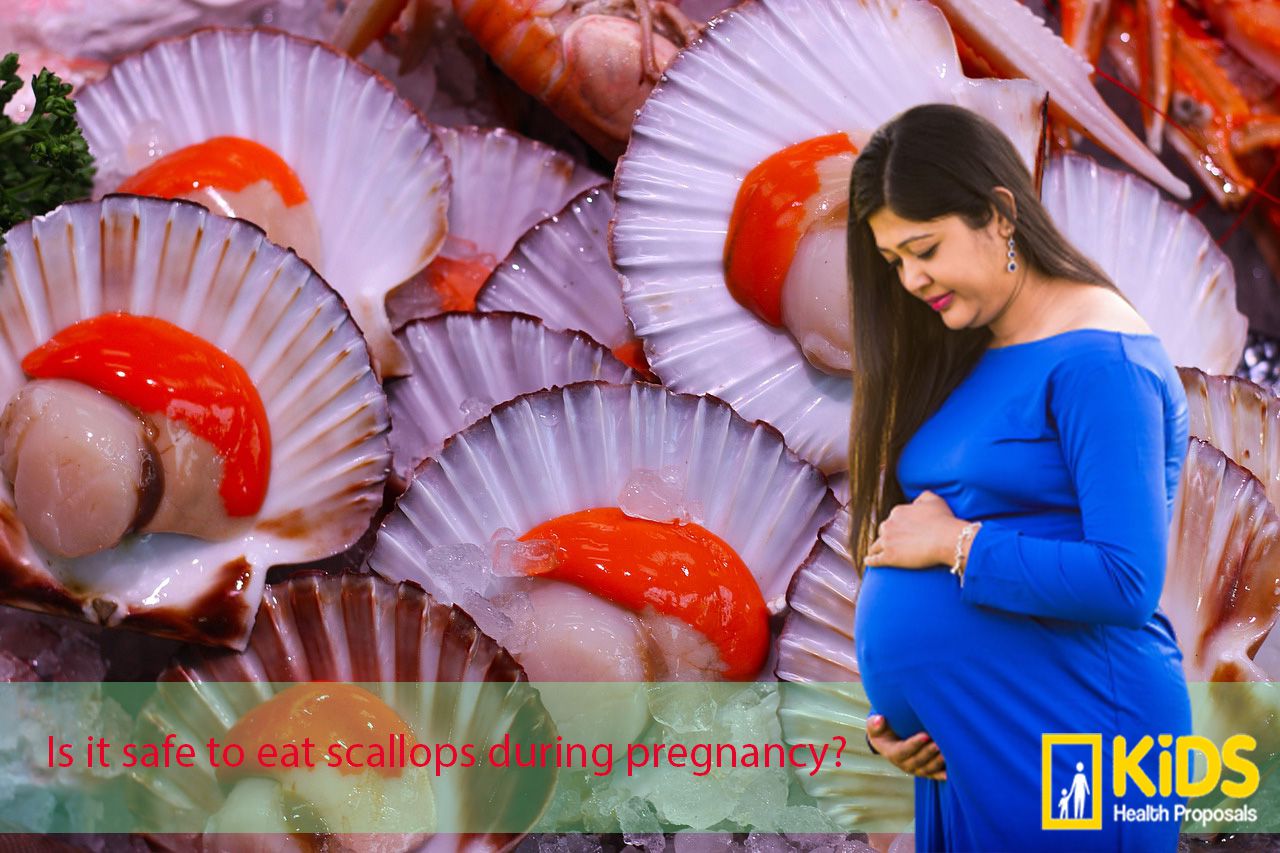
Consuming scallops are safe for pregnant women, as they contain low amounts of mercury. You can eat scallops safely twice a week while pregnant. Please do not overconsume. More than any meal is harmful. Be careful to buy fresh or frozen, not refrigerated, scallops. While scallops can be safely consumed twice a week during pregnancy due to their low mercury content, caution must be taken when eating raw seafood, and fresh or frozen scallops should be purchased instead of refrigerated ones.
If you buy the scallops fresh or frozen, you will get more nutrients. Avoid buying scallops stored in refrigerators to avoid the possibility of purchasing fewer scallops than fresh ones. And to get seafood for your health, choose a clean raw fish counter or a vendor you trust.
How to eat scallops during pregnancy?
The consumption of crustaceans and shellfish is usually limited to twice a week. To eat seafood, they need to be cooked. So in order to eat boiled scallops when you are pregnant, it has to be COOKED. Here is the only condition to be met.
It is always better to buy fresh seafood and cook it yourself and keep it in a clean refrigerator if necessary. Don’t buy shellfish that are already cooked and available for sale.
If you follow these rules, you have almost no risk of becoming infected with listeriosis. It is a disease that is transmitted by bacteria in meat, fish, seafood and cheese. It is only killed if the food is cooked at at least 70 ° C. So you can eat shellfish and crustaceans, but in small portions so as not to absorb too much mercury.
What are the benefits of eating scallops in pregnancy?
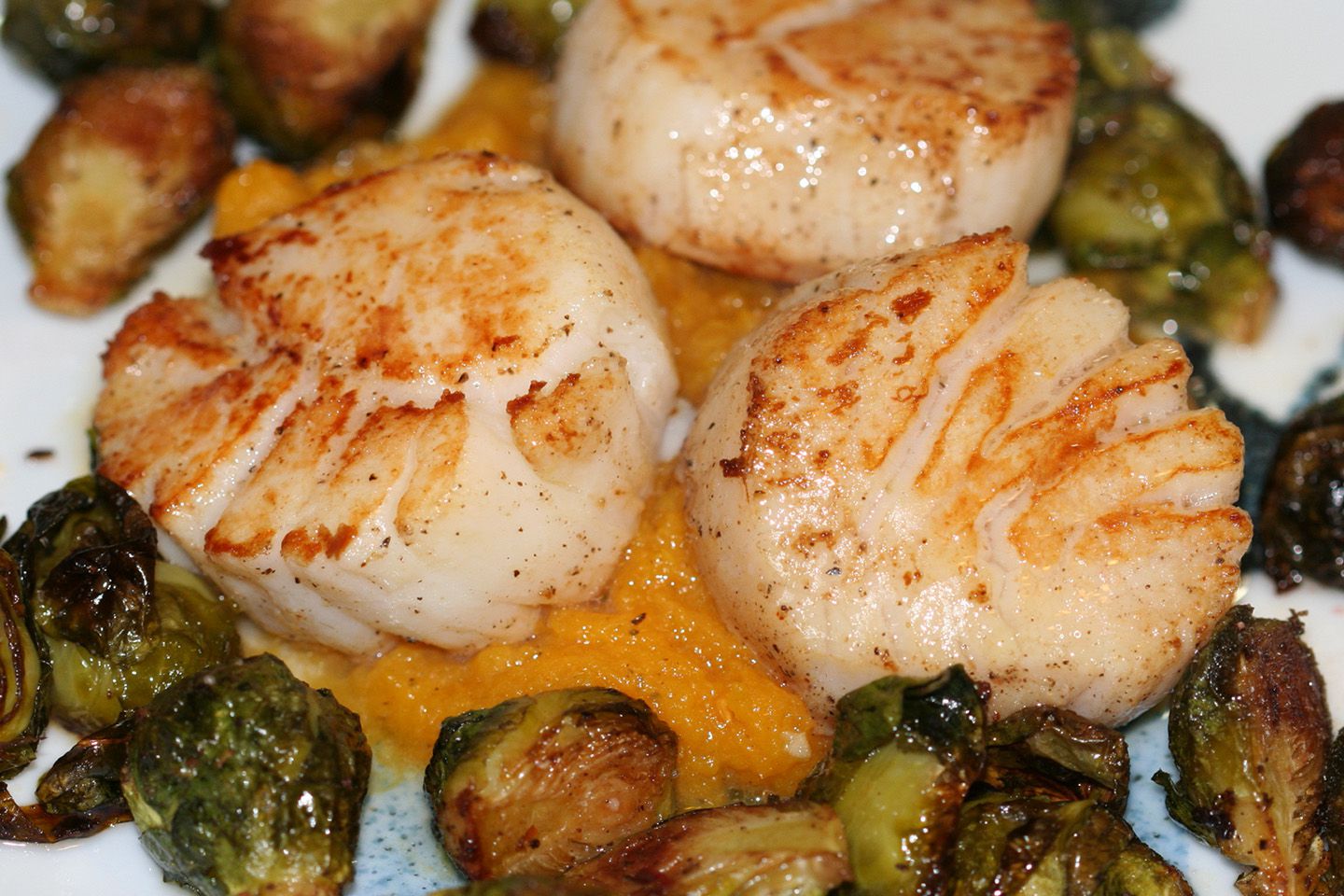
The scallop is known as one of the longest-living creatures in the world
Eating boiled scallops while pregnancy provides vitamins and trace elements. However, pregnant women should avoid undercooke scallops or raw scallops due to the risk of bacterial or viral infections, and always ensure that scallops are fully cooked and prepared safely to reduce the potential harm to both the mother and the baby.
To ensure that scallops are fully cooked and safe to eat, it is recommended to use a food thermometer to check that the internal temperature has reached at least 145°F, which can help to prevent foodborne illnesses during pregnancy.
The most important is iodine, which plays a very important role in the functioning of the mother’s thyroid gland and the correct brain development of the baby. Iodine is found in well-cooked shellfish, mussels, fish, dairy products, and eggs.
Pregnancy is a time when proper nutrition is especially important for both the health of the mother and the developing fetus. Seafood is a valuable source of important nutrients, and scallops are a particularly good choice for pregnant women. Here are some of the benefits of eating scallops in pregnancy:
- Rich in lean Protein: Scallops are a good source of high-quality protein, which is essential for the growth and development of the baby. A 100-gram serving of scallops contains approximately 20 grams of protein, making it an excellent source of this vital nutrient.
- Low in Mercury: Mercury is a toxin that can be harmful to developing fetuses. However, scallops are a low-mercury seafood option, making them a safer choice for pregnant women. The FDA recommends that pregnant women eat 2-3 servings of low-mercury seafood per week, and scallops are a great choice.
- Rich in Omega-3 Fatty Acids: Scallops are a good source of omega-3 fatty acids, which are essential for the development of the baby’s brain and eyes. Omega-3s also have anti-inflammatory properties and can help reduce the risk of preterm labor.
- Good Source of Iron: Iron is important for the production of red blood cells and the prevention of anemia, which is common during pregnancy. Scallops are a good source of iron, with a 100-gram serving containing approximately 1.8 milligrams of this essential mineral.
- Easy to Digest: Many women during pregnancy experience digestive issues, such as nausea and heartburn. Scallops are easy to digest and are unlikely to cause these problems, making them a good choice for women with digestive issues.
In conclusion, scallops are a nutritious and safe seafood option for pregnant women. They are a good source of protein, omega-3, iron, and other important nutrients, and are low in mercury. As with any food, it’s important to consume scallops in moderation and as part of a balanced and varied diet.
Is there a risk to eat scallops while pregnant?
While scallops can provide a variety of health benefits to pregnant women, there are also some risks to be aware of. One of the primary concerns is the potential for contamination with harmful bacteria, such as Vibrio parahaemolyticus or E. coli. These bacteria can cause foodborne illness, which can be particularly dangerous for pregnant women and their developing fetuses.
Additionally, scallops may contain low levels of mercury, which can be harmful to developing fetuses. However, the levels of mercury in scallops are generally considered to be low, and pregnant women can safely consume up to 12 ounces of cooked scallops per week.
It is also important to note that some individuals may be allergic to shellfish, including scallops, and may experience allergic reactions after consuming them. Allergic reactions can range from mild to severe and may include symptoms such as hives, swelling, and difficulty breathing.
To reduce the risk of foodborne illness and other potential risks, it is important to ensure that scallops are cooked thoroughly before consumption. Pregnant women should also avoid consuming raw or undercooked scallops, as well as other raw or undercooked seafood.
As with any food, it is important to consume scallops in moderation and as part of a balanced and varied diet. Pregnant women should consult with their healthcare provider to determine the best dietary plan for their individual needs.
What is a scallop?
The scallop animal, which has lived in deep waters for years, is a very interesting crustacean because of its high nutritional value and for other reasons. The sea scallops, which the divers collect by hand from the bottom of the sea to the nets, are located in the shallow areas of the sea.
A scallop is a type of bivalve mollusk with a distinctive fan-shaped shell that is often enjoyed for its delicate flavor and texture. The edible part of the scallop is the adductor muscle, which is located inside the shell and is used to open and close it. Scallops are found in oceans and seas around the world and are commonly harvested for food. They are a low-calorie and nutrient-dense food and are a good source of protein, omega-3 fatty acids, and vitamin B12. Scallops are a popular seafood option and can be prepared in a variety of ways, from seared or grilled to raw in sushi or cooked scallop sashimi and scallop ceviche.
If you like to consume scallops, we recommend reading the article can pregnant women eat crab?
How to clean the scallop? Step-by-step guide
To prepare scallop dishes cleaning scallops is an important step in preparing them for cooking. Here are the steps to follow to clean and prepare scallops:
- Remove the Scallop from the Shell: To remove the scallop from the shell, use a paring knife to carefully cut around the edges of the shell, separating the two halves. Be careful not to damage the adductor muscle, which is the edible part of the scallop.
- Remove the Black Sac: Inside the scallop, there is a black or gray sac attached to the adductor muscle. This sac can be tough and unpleasant to eat, so it should be removed. To do this, use the tip of a paring knife to gently lift and remove the sac.
- Rinse the Scallop: Rinse the scallop under cold water to remove any sand or debris. Be sure to rinse the adductor muscle thoroughly, as it can often trap sand or grit.
- Pat the Scallop Dry: Use a paper towel to pat the scallop dry. This will help the scallop cook evenly and prevent it from sticking to the pan.
- Optional: Remove the Muscle Foot: Some scallops may also have a small muscle foot attached to the adductor muscle. This can be removed by using the tip of a paring knife to gently lift and cut it away.
Once the scallops are cleaned and prepared, they can be cooked in a variety of ways, including searing, grilling, or poaching. Scallops are a delicate seafood option, and they cook quickly, so be sure to watch them closely to avoid overcooking. However, pregnant women should avoid consuming smoked seafood due to the potential risk of listeria, and instead opt for fully scallops that are prepared and cooked with caution to ensure the safety of the mother and her unborn child.
In conclusion, cleaning and preparing scallops is a simple and straightforward process that is essential for ensuring their delicious flavor and texture. With just a few simple steps, you can enjoy this popular and versatile seafood option in a variety of delicious dishes.
How to cook a tasty scallop?
Scallops are a delicious and versatile seafood option that can be cooked in a variety of ways. Incorporating scallops into a healthy diet can provide pregnant women with essential nutrients, including protein, omega-3 fatty acids, and vitamin B12, that support fetal growth and development.
Here are some tips how to cook scallops:
- Start with Fresh Scallops: Fresh scallops will have a mild, sweet aroma and a firm texture. Look for scallops that are moist and have a slightly translucent appearance.
- Season the Scallops: Scallops have a delicate flavor that can be enhanced with a variety of seasonings. A simple seasoning of salt and pepper can bring out the natural flavors of the scallops, while a more complex seasoning blend can add depth and complexity.
- Sear the Scallops: Searing scallops is a popular cooking method that results in a crispy, caramelized exterior and a tender, juicy interior. To sear scallops, heat a small amount of oil or butter in a skillet over medium-high heat. Add the scallops to the skillet and cook for 2-3 minutes on each side, until golden brown.
- Grill the Scallops: Grilling is another popular method for cooking scallops. Brush the scallops with a little bit of oil to prevent sticking, and grill over medium-high heat for 2-3 minutes on each side, until browned and cooked through.
- Avoid Overcooking: Scallops cook quickly, and overcooking can result in a tough and rubbery texture. Cook scallops just until they are opaque and cooked through, but still tender and juicy.
With these tips in mind, you can easily cook up a tasty and delicious batch of scallops that will satisfy your seafood cravings. Whether you prefer them seared, grilled, or poached, scallops are a flavorful and versatile option that can be enjoyed in a variety of dishes. However, it’s important to note that pregnant women should avoid consuming uncooked seafood to reduce the risk of bacterial or viral infections, and always cook scallops thoroughly before eating.
We have shared all the tricks of the scallop, which we think is very challenging to clean and cook, and a recipe that you can eat scallops safe. To ensure the safety of pregnant women when consuming scallops, it is recommended to opt for fully cooked dish that are prepared through boiling, broiling, baking, or frying, which can help to eliminate any potential bacteria or viruses that may cause harm.
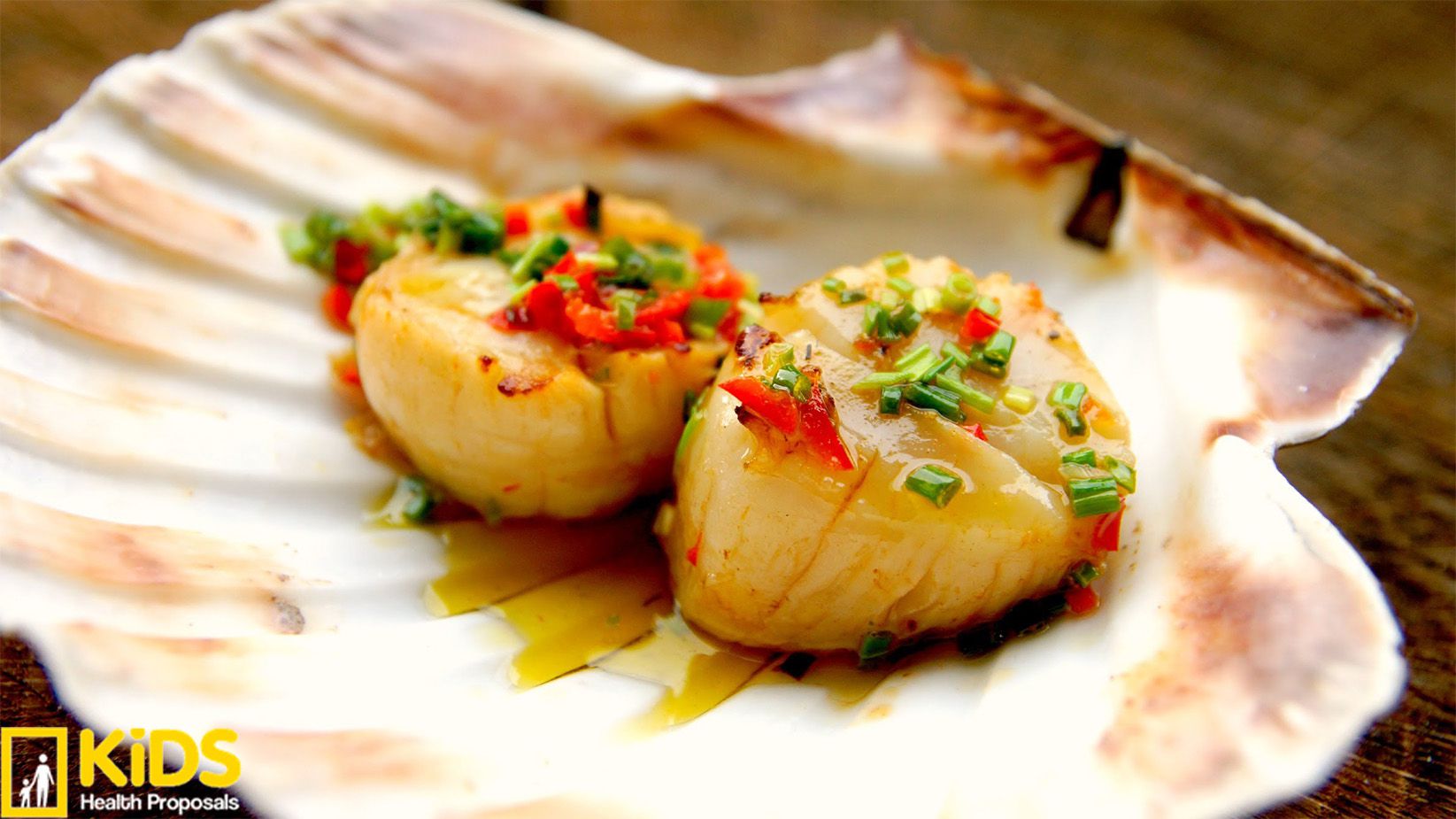
Ingredients
- 300 grams of scallops
- 1 tablespoon butter
- 2 cloves of garlic and half a bunch of parsley
For the bechamel sauce:
- 1 tablespoon butter
- 3.5 tablespoons flour
- 1 glass of water Milk
- 2 cloves of garlic and 1 teaspoon of mustard
- Half a cup of cognac
- For the Top of the Sea Comb
- Gravy cheese up to 100 g and a pinch of parsley
How to make scallops?
- Put scallops in a deep ceiling and let them boil.
- Then put the butter in a pan. We also chop garlic and parsley. You need to sauté by putting the sea comb next to the garlic and parsley added to the pan.
- For the béchamel sauce of the sea comb, the pan is roasted until butter and flour turn yellow. A glass of warm milk is added to the roasted flour and butter.
- When boiling, mixing is continued by adding the crushed garlic, mustard and brandy.
- After taking the oven container and placing the sea scallops, bechamel sauce is poured on it.
- In order to increase the flavor more according to the preferences, after adding the gravy cheeses, the cheeses are cooked in a moderately preheated oven until melted.
- After the whole process is over, you can serve the sea scallop, which is an extremely delicious recipe.
Is it safe to eat scallops during pregnancy F.A.Q.
FAQ
How many scallops can a pregnant woman eat?
The American Pregnancy Association recommends that pregnant women can safely consume up to 12 ounces of cooked scallops per week. It is important to ensure that the scallops are fully cooked to avoid any potential risks from consuming undercooked seafood during pregnancy.
Can you eat scallops when pregnant NHS?
Yes, it is safe to eat scallops during pregnancy, as long as they are cooked thoroughly. It is recommended that pregnant women eat two servings of seafood per week, which can include scallops. However, it is important to choose low-mercury fish and seafood, as high levels of mercury can be harmful to a developing baby.
Is scallop high in mercury?
No, scallops are not high in mercury. In fact, they are considered a low-mercury seafood and can be consumed in moderation during pregnancy. However, it is still recommended to limit consumption of seafood to 2-3 servings per week and to choose a variety of low-mercury options.
Is scallop good for baby?
Scallops are a good source of protein, vitamin B12, magnesium, and potassium, which can be beneficial for fetal growth and development. However, it’s important to limit seafood intake during pregnancy and choose low-mercury options. Pregnant women can consume up to 2-3 servings of low-mercury seafood per week, including scallops, to get the health benefits without exceeding safe mercury levels.
What seafood is OK during pregnancy?
Some types of seafood that are generally considered safe to eat during pregnancy include salmon, shrimp, pollock, catfish, tilapia, cod, and light canned tuna (not albacore). It is recommended to limit intake of certain types of seafood, such as shark, swordfish, king mackerel, and tilefish, due to their higher levels of mercury. It is also recommended to avoid raw or undercooked seafood, as well as refrigerated smoked seafood. It is best to consult with a healthcare provider for specific recommendations based on individual circumstances.
Are seared scallops fully cooked?
Seared scallops can be fully cooked, but it depends on the technique and the temperature used. It’s important to make sure that scallops are cooked to an internal temperature of 145°F to reduce the risk of foodborne illness.
Are scallops good for fertility?
Scallops are a good source of protein and low in fat, which can be beneficial for a healthy diet. However, there is no scientific evidence to suggest that scallops or any other specific food can enhance fertility. It is important for both men and women to maintain a balanced and healthy diet for overall well-being and reproductive health.
Our previous article 15 Signs Of Pregnancy To Know If You Are Pregnant in the title Am I pregnant ve pregnancy exercises information is provided..

Hello, I’m Dorothy. I love writing and researching articles. Reading books about baby health, care and pregnancy is my favorite. I will be sharing delicious and healthy information on food and baby food during pregnancy.









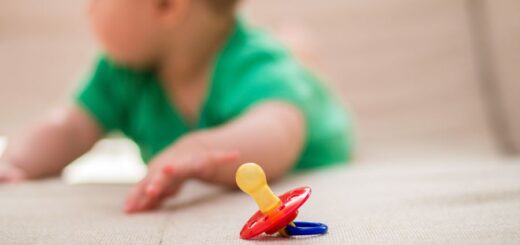

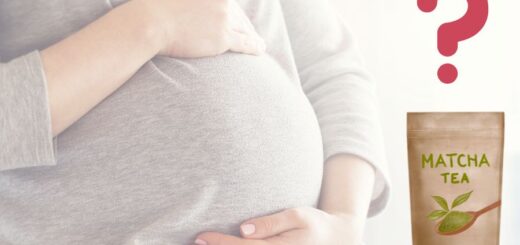
1 Response
[…] Relevant post >> Scallops and pregnancy: Is it safe? […]